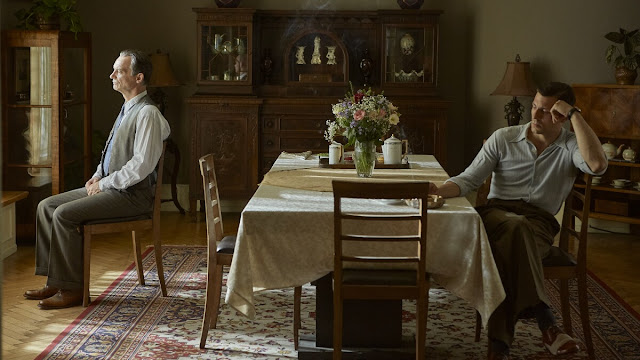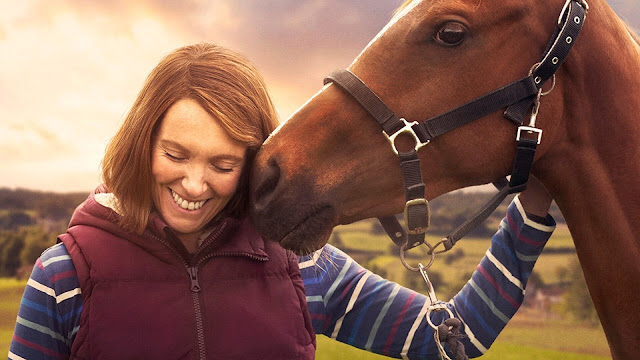 |
| Ivan Trojan and Juraj Loj in Charlatan. |
Agnieszka Holland’s Charlatan is based on the little-known story of Jan Mikolášek (an authoritative performance by Ivan Trojan), a Czech herbalist and faith healer who was arrested by the Communist government on a trumped-up murder charge in the 1950s. As a young man in the 1930s (played by Trojan’s son Josef), Jan is trained by an aging healer (Jaroslava Pokorná) to interpret the ailments of the sick by “reading” their urine; his apprenticeship is in direct defiance of his farmer father, who locks him in his room to keep him at home. Jan takes a hatchet to the bedroom door – and almost uses it on his father. When the old woman, Mühlbacherová, dies, he takes over her practice and his herbal treatments become so famous that during the war he is even called upon to dispense curatives to high-ranking Nazis. He gets in hot water from both sides: a Czech Gestapo officer (Joachim Paul Assböck) whose little girl he couldn’t save arrests him and beats him, and after the war he’s charged with collaborating. His protector is the Czech president, Zápotocky (Ladislav Kolár), who is one of his patients. But after the president dies Jan and his assistant, Frantisek Palko (Juraj Loj), are put on trial as charlatans and murderers.
The Polish-born, Czech-trained Holland, whose breakthrough film was the startling 1991 Europa Europa, about a teenage Jewish boy whose un-Semitic looks allow him to hide in plain sight as a member of the Hitler Youth, has also worked in England and Hollywood. Now in her mid-seventies, she has been experiencing a late-career renaissance. Mr. Jones, her biography of Gareth Jones, the Welsh journalist who uncovered the story of Stalin’s man-made famine in the Ukraine, was one of the best movies of 2020: she took an unconventionally poetic and elegiac approach to the grim, horrifying material. Mr. Jones didn’t garner the attention it merited. Charlatan isn’t quite as good; it’s rather austere and unyielding, which has historically been Holland’s shortcoming. But it’s gripping and emphatically off the beaten path. (Her next project is a movie about Franz Kafka.)
Holland and her screenwriter, Marek Epstein, unfold the complicated narrative in a series of flashbacks. The script is deliberately fragmented and takes narrative leaps; you have to concentrate to get all the details. And some of them remain ambiguous. Epstein has made the choice to depict the relationship between Mikolášek and the younger Palko, about which there was apparently speculation, as definitely gay, which heightens the peril that hangs over both men, since homosexuality was a capital offense in totalitarian Czechoslovakia. In the film, Frantisek is married, but he lives in Jan’s house, officially because his around-the-clock work in the clinic demands his continual presence. It’s a complex love affair – Frantisek’s loyalty to his wife (Jana Kvantiková) is the occasion for explosions of jealousy on Jan’s part, and when she becomes pregnant he urges Frantisek to induce a miscarriage with one of his herbal teas. It seems that Palko does what his lover asks, but this section of the plot is a little unclear. Some of Jan’s other behaviors remain puzzling. He’s a generous man who uses his own money to send poor patients to the seaside for their health. So it’s hard to know what to make of a scene in which the young Mikolášek, instructed by Mühlbacherová to drown a litter of kittens as mercifully as possible because her household, holding on by the skin of her teeth, can’t afford to feed them, instead batters them to death. And his betrayal of Palko at their trial is baffling. (There isn’t a false note in the cast, but Juraj Loj gives the outstanding performance as the sensitive, devoted Palko.) Holland and Epstein may have been prompted by the exotic nature of the story, which flirts with folk-fable form and magic realism but never goes over the edge, to produce something that isn’t easy to decipher. In recent art-house pictures like The Power of the Dog and The Lost Daughter, the fact that the characters behave in symbolic ways that don’t make basic sense is a sign that the filmmakers don’t know what the hell they’re doing. But the mysteries of the protagonist’s motivation in Charlatan has the opposite effect: it strengthens the portrait of a man of conflicting parts.
 |
| Édouard Sulpice, Eric Nantchouang and Salif Cissé in All Hands on Deck. |
The French comedy All Hands on Deck, written by Guillaume Brac and Catherine Paillé and directed by Brac, is a pleasing trifle and something of a shaggy dog story. Félix (Eric Nantchouang), a young African man with a dazzling smile, hooks up with Alma (Asma Messaoudene), a pretty Parisian bourgeoise, during a dance by the Seine, and on impulse he follows her to the countryside, where her family has rented a vacation house. To pull off this surprise, he carpools with his best friend, Chérif (Salif Cissé) and a nerdy white stranger, Édouard (Édouard Sulpice), whose mother’s car is their means of transport – and who immediately damages it in an accident that strands them until he can get it repaired. Alma isn’t happy to see Félix and the only member of her family she introduces him to is her sister Lucie (Lucie Gallo), who treats her rejected suitor with more kindness than she does. (Alma denies that her reluctance to invite him over to the house has anything to do with race, claiming that her parents are liberal, but we can’t help wondering.) Félix exhibits a jealous streak; he’s at his worst when they make the acquaintance of a confident athlete (Martin Mesnier), though he turns out to be more interested in Lucie than in Alma. Chérif opts out of the water activities, pleading an ear infection, and hangs out with a young woman (Ana Blagojevic) with an absent husband and a toddler. And Édouard, whose awkwardness seems at first to be the major object of the movie’s jokes, is ultimately the most game of the trio – and the most loyal. This is one of those movies about the redemptive qualities of a holiday in nature, but none of the plot developments exactly meets our expectations and neither do the characters, so we’re kept in a constant state of surprise. The young actors are charming and spontaneous, especially Sulpice and Cissé. The worst thing about the picture is its generic title, which doesn’t even fit the plot.
 |
| Toni Collette in Dream Horse. |
Dream Horse is based on a true-life tale of a Welsh village that forms a syndicate to produce and train a racehorse. It’s not one of the great horse movies like The Black Stallion or National Velvet, but it’s very enjoyable, mostly because Neil McKay’s screenplay is understated and the cast, headed by Toni Collette, Damian Lewis and Owen Teale, is skilled and winning. The theme is worn: it’s all about people whose commitment to their mission to come up with a champion resurrects the dreams they’ve long since given up on. (The name they give the horse is Dream Alliance). But the actors, who include old pros like Siân Phillips and Nicholas Farrell, keep the film fresh, with the aid of the cinematographer Erik Wilson, who shot the Paddington movies and The Electrical Life of Louis Wain and the TV miniseries Landscapers and who seems constitutionally incapable of making any frame look ordinary. The director, Euros Lyn, does a nice job with the racehorse scenes and only occasionally gets mired in sentimentality or misjudges his comic effects – usually in the scenes involving Karl Johnson as a hard-drinking old codger. You’d be advised to sneak out just as the end credits are starting so you don’t have to watch Johnson lead the other actors (and the real-life versions of the characters played by Collette, Lewis and Teale) in a karaoke rendition of Tom Jones’s “Delilah.”
 – Steve Vineberg
is Distinguished Professor of the Arts and Humanities at College of the
Holy Cross in Worcester, Massachusetts, where he teaches theatre and
film. He also writes for The Threepenny Review and is the author of
three books: Method Actors: Three Generations of an American Acting Style; No Surprises, Please: Movies in the Reagan Decade; and High Comedy in American Movies.
– Steve Vineberg
is Distinguished Professor of the Arts and Humanities at College of the
Holy Cross in Worcester, Massachusetts, where he teaches theatre and
film. He also writes for The Threepenny Review and is the author of
three books: Method Actors: Three Generations of an American Acting Style; No Surprises, Please: Movies in the Reagan Decade; and High Comedy in American Movies.
No comments:
Post a Comment